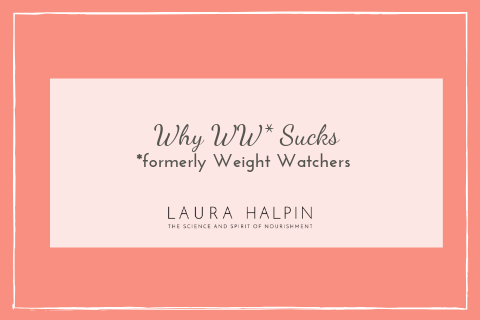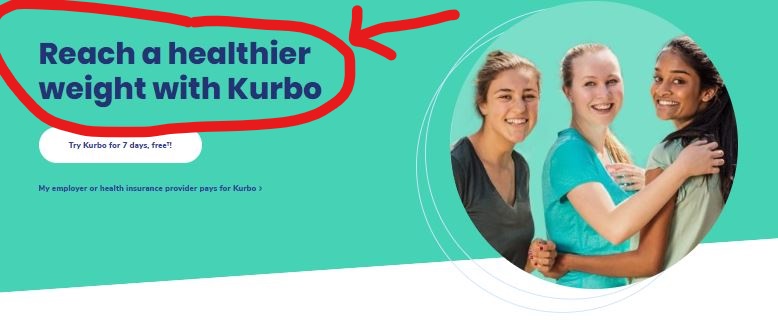
Why WW Sucks
I’ve been fuming ever since I received a friend’s email last week sharing WW’s new family wellness app called Kurbo. (You might not be aware that “WW” is the new name of Weight Watchers, a rebrand caused by a money-motivated distancing from “dieting.”) Kurbo is an app that targets kids starting at 8 years old.
But before you ask what’s wrong with wellness apps, let’s just get clear on what WW’s Kurbo is really all about. Despite its talk about “healthy habits,” WW leads with this on its Kurbo website banner:

As further evidence that this program is centering body size as the goal of healthy habits:

Introducing weight fixation at a time when bodies are naturally designed to gain weight sets teenagers up for an impossible endeavor. According to National Eating Disorders Association, “There is no long term evidence showing that weight loss can be maintained in the majority of those who lose weight.” In fact, no matter what the initial weight of the dieter, one of the strongest predictors of weight gain is dieting (1).
There is evidence for the harm resulting from diet behaviors. A large 2016 study of 14- and 15-year olds concluded “dieting was the most important predictor of a developing eating disorder” (2).
Considering that eating disorders have the second highest mortality rate of any mental health disorder, encouraging dieting behavior with children and teens is unethical. A weight-centric health approach promotes weight-based discrimination and potentially a lifetime of body shame. According to this dense and nuanced research article, "What's Wrong With the 'War on Obesity?'" our weight focused health paradigm creates "an environment that creates and sustains fat phobia and oppression, including weight bias, prejudice, stigma, discrimination, bullying, violence and cultural imperialism" contributing to "reduced physical, mental, social, spiritual health and well-being." (By the way, the linked article is the best I've read thus far regarding the inaccuracies and harm of a healthcare paradigm rooted in body size).
A path out of diet culture
I am part of a growing community of healthcare providers, helping professionals and activists concerned about the health effects of the war on obesity and the effects of living in a culture that pathologizes certain bodies while glorifying others.
Rather than equate health with size, we can learn to trust, enjoy and care for the bodies we are in while encouraging our children to do the same.
I hope you will find the information below helpful and supportive.
Shifts to help us divest from diet culture.
Make decisions about food and physical activity that are weight neutral. Eat foods because they help sustain your energy, or because you love them, not because they are "green light foods" or have a particular point or calorie count. Go on a run because it keeps your heart strong, or helps your mood or energy levels, not because running will change the size of your body or burn off the food you just ate.
Become aware of weight neutrality in the way you talk about food, movement and bodies.
Embrace the truth that one cannot know someone else's health status by one's body size. One cannot tell if a person is physically active, addiction free, mentally stable, happy, heart healthy, eating enough, and eating nourishing foods by the size of one's body. (More about BMI and health in a future article).
Avoid complimenting weight loss. A person could be losing weight because of cancer treatment or illness, depression, dieting or eating disorder. Complimenting weight loss reinforces diet culture values. It also places value on a body size that might end up growing back to a previous size.
Avoid expressing concern about someone's weight gain. The world is already screaming its concern about weight. Your concern does not help.
Refrain from voicing your own body criticisms in conversation. It's possible you'll be talking to someone who is working hard to accept her own body.
Keep in mind that eating is a morally neutral activity. People do not become more virtuous because of the foods they are eating or not eating. You are not a better person because you're restricting carbs, cutting out sugar, on a cleanse, gluten free, or vegan. Can you feel the same about your worth when you are drinking green smoothies as when you are enjoying a milkshake?
Become more aware of being food judge-y. Rather than food being "good" and "bad" or "junk" and "clean," Signe Darpinian, co-author of No Weigh: a Teen's Guide to Positive Body Image, Food and Emotional Wisdom, suggests using the terms "work food" and "play food."
This terminology can help us make discerning food choices based on the task at hand. For example, if my child needs to concentrate at school, eating "work food," like oatmeal and fruit or eggs and avocado makes sense. The Fruit Loops in the cabinet, "play food," are available when the body doesn't need fortification. (Mind you, this is not about encouraging Fruit Loop consumption. This is about taking the judgment and shame out of eating.) We can ask our children to consider what their body needs and help them develop skills around choosing appropriate foods without demonizing foods.
Don't make yourself or someone else "earn dessert." In the Kurbo app, a user (meaning a CHILD) is instructed to wake up early and work out for at least 1 hour before eating cake at a birthday party. According to Ragen Chastain's article "Weight Watchers: Harming Kids for Profit," this "earning" of sweets" sets kids up to see exercise as prevention of and/or punishment for not being thin..." It also reinforces the belief that one needs to exercise in order earn the right to eat. This belief, according to Chastain, "is a red flag for disordered eating."
Begin to notice how much restriction is glorified in our culture.
Learn to accept, appreciate and celebrate body diversity. Everyone deserves to live in peace in their bodies. Catch yourself scrutinizing someone's body or what they're eating and know that that scrutiny is a result of diet culture. See if you can replace the scrutiny with respect and take a moment to acknowledge that person's humanity and dignity.
Let's work to change the culture, not people's body size.

-
O'Hara, Lily and Taylor, Jane. (2018). What’s Wrong With the ‘War on Obesity?’ A Narrative Review of the Weight-Centered Health Paradigm and Development of the 3C Framework to Build Critical Competency for a Paradigm Shift. Sage Journal, vol 8, issue 2. doi.org/10.1177/2158244018772888
- Golden, N. H., Schneider, M., & Wood, C. (2016). Preventing Obesity and Eating Disorders in Adolescents. Pediatrics, 138(3). doi:10.1542/peds.2016-1649




